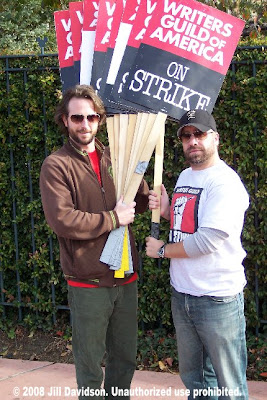 Edward Allen Bernero "Third Watch" Interview 2004
Edward Allen Bernero "Third Watch" Interview 2004"I love all my characters - even firemen. And cops hate firemen!" - Ed Bernero
On a non-descript street in Brooklyn, wedged in between a razor-wired lot and what looked like an industrial warehouse, you'll find the 55th Precinct, a familiar looking firehouse and the hub of Third Watch activity. On this day, Executive Producer/Co-Creator Ed Bernero was at the center of the hub. Ed, a boyish looking man in a personalized "BERNERO" jersey, sat down with NBC.com to discuss the show, this season's big changes and Chicago versus New York.
How did the idea for Third Watch come about?
I worked on a show called "Trinity" with John Wells, who created "ER". I always wanted to do a paramedic show and John wanted to do a cop show. When "Trinity" was cancelled, John asked me if I wanted to do a show and we sort of put our two ideas together. It started as a cop/paramedic show and then we added firemen to it.
How did your experiences as a cop affect your influence on Third Watch?
I was a cop for 10 years in Chicago, then I moved to Los Angeles to work on a show called "Brooklyn South." A little known fact is that cops hate firemen. Firemen come in, they save the day and then they leave cops to clean it up. Firemen sleep 14 to 15 hours of their 24-hour shift. Firemen cook another 4 hours out of that shift. Most days they work, they don't have a fire to go to so they wash the truck, watch DVDs, cook and go to bed. They also work 1 day for every 3 days because they work a 24-hour shift! It's like the world's greatest part time job.
And, they're chick magnets!
(Laughs) Yeah, I'm truly mystified by that. AND they hate cops.
Maybe they've heard you talking about them.
[When I was a cop], we used to cruise by the firehouse in my district in the middle of the night and blast the siren to wake the firemen up.
And yet you added firemen to Third Watch.
The trick is that every one of these characters is me in some way, shape or form. Although the actors all come up to me and say (whispers), "I know I'm really you." Especially the cop characters. They are all actually me at different parts of my career.
Cop stories are in some way more compelling so people remember them and forget the fire stories. Every year we get letters to save the FDNY in Third Watch and I'm like "Where'd it go?" I would get sad if we ever got rid of those stories.
Do you have FDNY consultants on set?
We have a doctor, a paramedic, a cop and a recently retired fire chief. Our consultants read every script and write notes. We rely very heavily on them because reality is very important to us. If it's not real, we don't do it. Whenever we do a big cop arrest or something like that, our cop is there [on set]. If it's a fire, the fire consultant is there.
How is Chicago different from New York, where Third Watch is set?
It's a very different city. The interesting thing about Third Watch is that we're actually portraying Chicago in New York. Just the term "third watch." There is no such thing in New York. The shifts are called watches in Chicago. The third watch is the 3pm to 11pm shift.
They do it here in New York now because of the show. The paramedics were scratching off "shift" next to third shift and writing "watch."
Has there been any flack from New Yorkers because of the discrepancies?
I get flack sometimes for [using the term] "jag-off." A lot of our characters say "jag-off", which is a stone Chicago term. In fact, Michael Beach ("Doc") would never say it because he's from New York. He said, "We don't say that in New York."
Speaking of "Doc", has it been hard to get rid of some of your core characters? Was it a mutual decision for them to leave the show?
Most of the time it was mutual. Actually, with Michael it was more him than us. I miss Michael, but he got bored with playing the good guy. The network was very protective of his character and felt he was the moral center of the show.
But it's also fun to have new people come in. As much as I love [the old characters], I think by the 6th or 7th episode of this season, these new characters will be very exciting.
So who would you say is the new moral center of the show?
We actually, very purposefully, don't have a moral center right now. I think that once that label was put on Michael, his character became inherently less interesting. We have characters who are flawed. We have a show that is much more of what we want the show to be - about ordinary people, who do extraordinary things. Sometimes they make mistakes. Sometimes they do things wrong. But most of the time, they are trying to do the right thing.
Like Yokas in this season's premiere avenging what she thought was Bosco's murder?
Yokas takes the law into her own hands. She has to deal with that the rest of the year. That's a character who in her soul is good. When she did something like [shoot the mob boss] you have to show what that does to her - someone who is basically a good person.
And since Cruz covered for her, it makes them unlikely allies.
Yes. I think that was a real surprise to everybody. Cruz and Yokas are now very reluctant co-conspirators. It's the last thing you would expect - them on the same side.
What else can we expect from this season?
You can expect to find out what happened when Ty's father was killed. There's a big surprise there, and [another current character] is involved. We have some new characters/actors this year including Josh Stewart as a firefighter and Cara Buono as a paramedic. One day people are going to say, "Hey, did you know Josh Stewart started on Third Watch?" It's fun to have new energy around. Some of us, we forget that this is kind of a cool thing [that we do].
How involved are you with every script, every episode?
Every script at some point goes through my computer. We break stories and beats together and then each writer is assigned to go write an outline. Then we tear that to pieces (smiles) and start over again!
Each script goes through three or four revisions until we're all happy with it. There's a point after the first draft comes out that we have a cast read-through. We have a pretty amazing cast, so they have an opportunity to call the writers directly with their thoughts and notes.
That's amazing that the actors have that kind of access and input.
When you're writing something involving 9 or 10 characters, it's great to get the perspective of someone who only thinks of one character. All we really care about is that the episodes be as good as they can.
Don't you have to stick to a plan as far as character arcs?
We kinda know where we want the characters to be at the end of the season. We start every year by putting up dozens and dozens of story ideas, newspaper clippings, etcetera. Then we sort of pick and choose stories based on where we want characters to go over the season.
Which characters have changed the most since Third Watch's debut?
I think they all have. I'm amazed at how much they've all evolved. The show is different than the first season. We were "ER on the street." We just ran from job to job and nobody really knew who anybody was. Now, it's a much more character-driven show. The stunts and events are secondary. They're huge, movie-style stunts, but they don't really drive the episodes, the personal stories do.
Did September 11th change any aspect of the show?
No. Actually, I felt that the rest of the country caught up to what we already knew: These people are heroes. That's why we did the show in the first place. It was no surprise to us that [the firemen and cops] risked their lives and lost their lives saving people on September 11th. That's who these people are.
Does anything ever happen that forces changes in the storylines or the season arcs?
Yes, that happened to us this year. We had a very prominent member of the cast have a baby - which is the reason we are not ahead [in episodes] this year. We had to go back and re-break the entire season because we lost a central character for 6 episodes.
It happens every year. Something always happens. The best time is June and July, because it's just the writers and everything is perfect and anything is possible.
You mentioned you go online to gauge fan reaction. What types of sites do you visit?
I go online all the time. I'm always checking reactions. You listen to [fan input] to a certain point, but we work pretty far ahead. By the time people see episode 3, we're usually working on episode 7. [Having said that], fan reaction to what we do is very important. I log on after every episode airs on the east coast. Mostly I go to AOL's TV section. There's also thirdwatch.net, which a group of fans started. (Great job guys! B) ) There are websites that have been up since the show started and people don't get paid to do it! I just check as many sites as possible.
How would you like to see the show evolve as it continues?
The show is really getting to where I've always wanted it to be. It's a suspenseful show. It's a show about characters. It's a show about real people. It's a family drama - which is what I think all good cop dramas are.
I just hope we get a chance to keep doing the show forever! We have a cast and crew that are amazing.
http://www.thirdwatch.net/forum//index.php?s=4630a987684d56b5e1ce649d3d6f7405&showtopic=7292&st=0&p=93870&#entry93870









